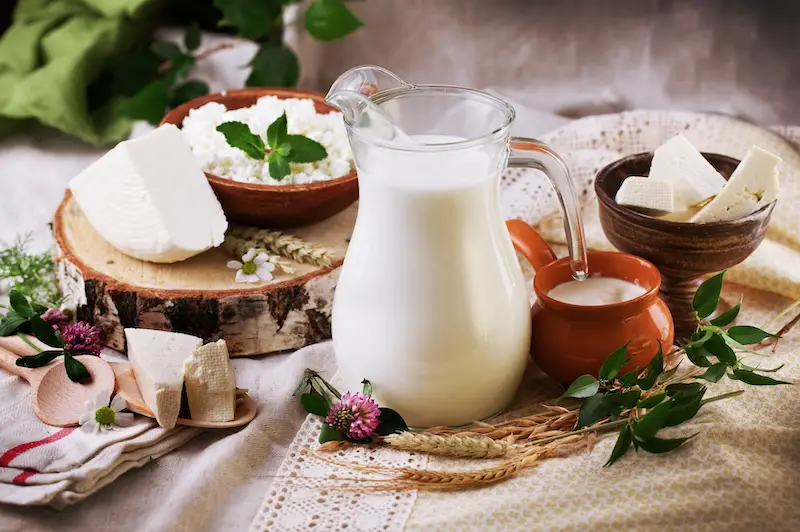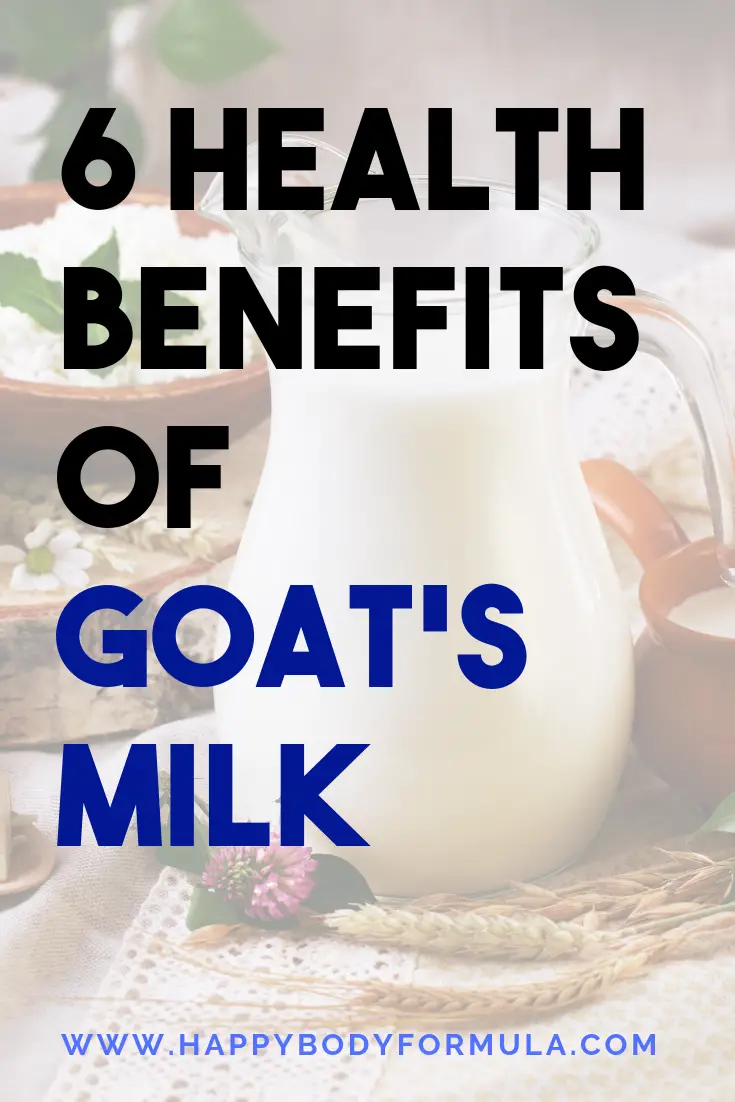

While cow’s milk is the most popular, goat’s milk is increasingly becoming a go-to option for a healthy dairy alternative. How do you know if goat’s milk is right for you?
Let’s explore the health benefits and nutritional profile of this nutrient-dense food.
What Is Goat’s Milk?
Goat’s milk is—as the name implies—milk that is retrieved from goats. It is rich in minerals and vitamins, protein, and more. It also contains healthy fatty acids that can protect the heart and balance cholesterol.
Goat’s milk is technically still a dairy product, just like milk from a cow, but it is used as an alternate option to cow’s milk because milk from goats is easier to digest and has a number of other health benefits.
In fact, many people who are allergic or intolerant of cow’s milk can easily digest goat milk.
Nutrition Facts for Goat’s Milk
Goat’s milk is widely consumed across the world. One cup contains roughly:
- 168 calories
- 10 grams of fat
- 11 grams of carbohydrates
- 9 grams of protein
- 33 percent daily value of calcium
- 27 percent daily value of phosphorous
- 20 percent daily value of riboflavin
- 14 percent daily value of potassium
- 10 percent daily value of vitamin A
- 9 percent daily value of magnesium
- 8 percent daily value of pantothenic acid
- 8 percent daily value of thiamine
- 7 percent daily value of vitamin D
- 6 percent daily value of copper
- 6 percent daily value of vitamin B6
- 5 percent daily value of vitamin C
- 5 percent daily value of selenium
- Smaller amounts of vitamin B12, niacin, manganese
6 Health Benefits of Goat’s Milk
Goat’s milk isn’t just something that you pour on your cereal or use for a smoothie. It’s a nutrient-rich food that offers many health benefits. These six are the top ways that you can increase your health by drinking goat’s milk.
Less Allergenic Than Cow’s Milk
Cow’s milk is one of the top eight allergens in the world, with many unable to drink it because of serious reactions. Beyond that, it is also a food that many are sensitive to, and even if it doesn’t pose a health threat, it causes digestive disturbance or upset stomach.
Goat’s milk, however, is a food that is tolerated more easily by many people and is a great alternative to people who struggle to digest cow’s milk. While goat’s milk and cow’s milk are similar in some ways, goat’s milk does not contain the protein that cow’s milk does, which is responsible for most allergic reactions.
Additionally, goat’s milk is the most similar to human breast milk in protein and nutrient composition, making it an excellent alternative for young children who are ready to be weaned from breastfeeding or transitioning from formula.
Supports Healthy Skin
Skin health can be a complicated issue, balancing internal nutrition with topical care, but goat’s milk is actually a food that supports skin health inside and out. It is chockfull of vitamin A, which helps to keep skin soft and supple.
Using goat’s milk soap or lotion can help to improve skin appearance and complexion, can reduce acne breakouts and blemishes, and can even improve overall skin health and vibrance.
Additionally, the lactic acid in goat’s milk helps to slough off dead skin and brighten the skin’s appearance, smoothness, and healthy thickness.
Increases Good Cholesterol
While cholesterol doesn’t cause heart disease, when LDL levels are elevated, there’s a chance that they could be oxidizing, which is what leads to plaque in the arteries.
By increasing our HDL cholesterol, we support our overall heart health. Goat’s milk is rich in medium-chain fatty acids, which are a type of healthy fat that bump healthy cholesterol levels up by fueling the body with a special kind of energy.
Promotes Strong Teeth & Bones
Almost everyone knows that calcium is essential for strong bones and teeth, but most people also think the best way to get that is to drink cow’s milk.
The good news is that goat’s milk is also a rich source of calcium that is easily digested and absorbed. Getting adequate calcium in the diet can help to prevent fractures and the development of osteoporosis.
Goat’s milk actually has more calcium than cow’s milk, at 33 percent daily value in one eight-ounce cup. Cow’s milk only has 28 percent daily value.
Improves Blood Health & Reduces Anemia
Iron is a mineral that is vital for many things, but primarily to ensure that the blood has enough oxygen to transport nutrients throughout the body. Goat’s milk helps the body to absorb dietary iron so that it can be used, which can help to correct anemia and low iron levels.
Some foods can make it hard for the body to absorb iron—even iron supplements. Goat’s milk can actually improve this type of absorption.
Fights Inflammation
Cow’s milk can cause a host of unpleasant symptoms in people, not the least of which is bloating and inflammation that can result in symptoms like skin breakouts and joint pain.
Goat’s milk is far less inflammatory and most people who can’t tolerate cow’s milk can enjoy goat’s milk while also gaining some health benefits—like enzymes in goat’s milk actually works to soothe the digestive tract.
Why Choose Goat’s Milk Over Other Milk?
There are two main reasons to choose goat’s milk over other types of milk—cow or plant-based.
The first is that goat’s milk is easier to digest and the second is that goat’s milk actually boosts your body’s ability to absorb nutrients—which isn’t true for any other type of milk or milk alternative.
Goat’s milk and cow’s milk contain similar amounts of fat, but goat’s milk contains a type that is easier to digest and break down, which means you get more benefits from it with less uncomfortable symptoms.
While cow’s milk has lactose, which is a problematic sugar for many, goat’s milk is much lower. People who have lactose intolerance are usually able to drink goat’s milk without any problems.
Consider this: goat’s milk actually increases absorption of many crucial nutrients in the body, and not just iron, as we discussed earlier.
It also helps improve uptake of calcium for bone and teeth health, magnesium for muscular health and relaxation, and phosphorous for helping the kidneys detox the body and boosting DNA health.
Goat’s milk is even being considered for treatment for things like anemia and low-density bones, as well as conditions like those with malabsorption in the intestines, restless legs, osteoporosis, and more. Goat’s milk can also boost hemoglobin levels, which is another way to address anemia beyond simply boosting iron levels.
How to Buy and Use Goat’s Milk
If you want to try goat’s milk, there are several ways to start incorporating it into your family’s diet. Goat milk can be purchased pasteurized, as most cow’s milk products are, or raw. Raw goat’s milk can have additional enzyme health benefits, but can be much harder to find.
Additionally, raw milk might not be the best option for small children, who could be more sensitive to bacteria that could be present in a raw milk product.
If you do want to try raw goat’s milk, buying directly from a farmer, at a farmer’s market, or as part of a co-op might be the only ways to get it. You can also get goat’s milk yogurt, cheese, and kefir—all of which can be delicious ways to add the health benefits of goat’s milk to your diet.
As a bonus, goat’s milk yogurt and kefir also contain probiotics from the natural fermentation, meaning they can help to correct bacterial imbalances in the gut.
The only downside to goat’s milk is that it is not as easily available as cow’s milk, which is found in every grocery store and gas station across the country.
Goat’s milk is typically more expensive because it is a more rare product, but many grocery stores are starting to carry it and if yours doesn’t, you can usually ask them to order it.
You can also purchase it from farmer’s markets or health food stores that might have connections to local farmers.
If you’ve never tried goat’s milk before, you might find it to be a lot stronger in taste and smell than cow’s milk, and that might initially be off-putting. But the benefits of goat’s milk outweigh initial discomfort at trying it.
When you’re first starting to use goat’s milk, it’s important to know that it can be replaced one-for-one in any recipe that calls for cow’s milk.
When goat’s milk is consumed cold, it doesn’t taste much different from cow’s milk, but when it is heated or cooked, it develops a more earthy taste than cow’s milk has, making it more distinctive in certain recipes.
The upsides to cooking with goat’s milk is that it is creamier than cow’s milk and when used in recipes, can provide a creamier and more satisfying texture.
Who Shouldn’t Drink Goat’s Milk?
Goat’s milk contains many nutrients that are beneficial for health, but that still doesn’t mean it’s right for everyone.
Even though it’s good for most people who can’t digest cow’s milk, some people might still be sensitive to the proteins in goat’s milk and may have similar reactions—bloating, stomach upset, constipation, and skin breakouts. If you demonstrate signs of sensitivity to goat’s milk, you shouldn’t drink it.
If you have never tried goat’s milk before, always start by tasting a small amount—maybe a few tablespoons or one-fourth of a cup. Then, try the same amount again a few days later, or increase it slightly.
If you don’t develop any signs of sensitivity, you’re probably able to consume goat’s milk.
Bottom Line
Goat’s milk is a nutrient-rich food that offers many vitamin and mineral benefits, as well as protein and healthy fats. It can be easier to digest than cow’s milk and can be a great dairy alternative.
While it might be harder to find in stores, it’s becoming more common as people catch on to its great health benefits.


References:
https://www.sciencedirect.com/science/article/pii/B9780128097625000358
https://ndb.nal.usda.gov/ndb/foods/show/01106?fgcd=&manu=&format=&count=&max=25&offset=&sort=default&order=asc&qlookup=Milk%2C+goat%2C+fluid%2C+with+added+vitamin+D&ds=&qt=&qp=&qa=&qn=&q=&ing=
https://www.ncbi.nlm.nih.gov/pubmed/17515510
Aimee McNew, MNT, CNTP, is a certified nutritionist who specializes in women’s health, thyroid problems, infertility, and digestive wellness. She ate her way back to health using a Paleo diet, lost 80 pounds, and had a healthy baby after numerous miscarriages. She focuses on simple nutrition practices that promote long-lasting results.
